AI-Based Predictive Scheduling for Dynamic Material Routing
The ability to optimize production schedules is essential to success. Production schedulers are tasked with the intricate job of orchestrating the flow of materials, machines, and manpower to ensure efficient operations and meet customer demands. However, traditional scheduling methods often fall short in adapting to the dynamic nature of material routing, leading to inefficiencies, bottlenecks, and missed opportunities.
Enter AI-based predictive scheduling—a groundbreaking approach that leverages advanced algorithms and machine learning to forecast demand, anticipate disruptions, and optimize material routing in real-time.
In this blog, we'll explore how production schedulers in packaging manufacturing facilities can harness the power of AI to revolutionize their operations, with a focus on integration between PlanetTogether and leading ERP, SCM, and MES systems like SAP, Oracle, Microsoft, Kinaxis, and Aveva.

AI-based Predictive Scheduling
AI-based predictive scheduling represents a paradigm shift in how production scheduling is approached. By analyzing vast amounts of data in real-time, AI algorithms can identify patterns, trends, and correlations that human schedulers may overlook. This enables predictive modeling of future scenarios, allowing production schedulers to make informed decisions and optimize material routing for maximum efficiency.
Key Features and Benefits:
Demand Forecasting: AI algorithms can analyze historical sales data, market trends, and external factors to predict future demand with unprecedented accuracy. By forecasting demand, production schedulers can proactively adjust schedules and allocate resources accordingly, minimizing stockouts and excess inventory.
Dynamic Material Routing: Traditional scheduling methods often follow predetermined routes for material flow. AI-based predictive scheduling, on the other hand, dynamically adjusts material routing based on real-time factors such as machine availability, inventory levels, and production constraints. This agile approach optimizes material flow, reduces lead times, and minimizes production costs.
Real-time Optimization: One of the key advantages of AI-based predictive scheduling is its ability to optimize schedules in real-time. As new orders come in or unforeseen disruptions occur, AI algorithms can quickly reevaluate schedules and recommend optimal solutions. This agility allows production schedulers to adapt to changing conditions on the fly, ensuring smooth operations and timely order fulfillment.

Integration with ERP, SCM, and MES Systems
The seamless integration between predictive scheduling software like PlanetTogether and ERP, SCM, and MES systems such as SAP, Oracle, Microsoft, Kinaxis, and Aveva unlocks additional capabilities and efficiencies in packaging manufacturing. Here's how:
Real-Time Data Exchange: Integration enables the exchange of real-time data between predictive scheduling and enterprise systems, ensuring that schedules are based on the most up-to-date information regarding orders, inventory levels, and production capacities.
Unified Visibility: Production schedulers gain a comprehensive view of the entire manufacturing process, from order entry to delivery, by integrating scheduling with ERP, SCM, and MES systems. This unified visibility facilitates better decision-making and coordination across departments.
Seamless Execution: Integrated systems allow for seamless execution of optimized schedules, with automatic updates to ERP, SCM, and MES systems regarding production progress, material usage, and inventory levels.
Continuous Improvement: By analyzing data from integrated systems, production schedulers can identify areas for improvement, refine scheduling algorithms, and implement best practices to further enhance efficiency and productivity.
AI-based predictive scheduling represents a game-changer for packaging manufacturing facilities seeking to optimize their operations. By harnessing the power of advanced algorithms and real-time data analysis, production schedulers can proactively anticipate demand, optimize material routing, and respond swiftly to disruptions.
Integration between predictive scheduling software like PlanetTogether with leading ERP, SCM, and MES systems such as SAP, Oracle, Microsoft, Kinaxis, and Aveva is essential to unlocking the full potential of AI-based predictive scheduling. Platforms like PlanetTogether offer seamless integration capabilities, enabling production schedulers to make informed decisions and drive efficiency across the entire manufacturing process.
As the packaging industry continues to evolve, embracing AI-based predictive scheduling will be crucial for staying competitive, meeting customer demands, and achieving sustainable growth. By investing in technology and innovation, packaging manufacturers can pave the way for a more efficient, agile, and resilient future.
Are you ready to take your manufacturing operations to the next level? Contact us today to learn more about how PlanetTogether can help you achieve your goals and drive success in your industry.